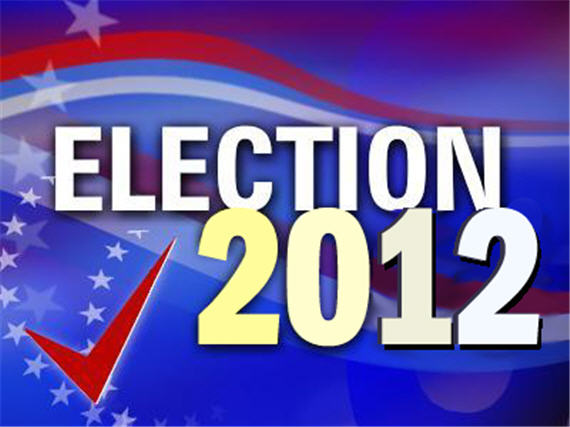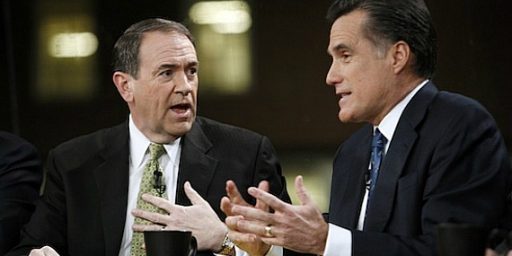Late Start to 2012 Presidential Race?
By this point in the last presidential cycle, there were already 14 major party candidates who had publicly announced. There are zero today.
Jim Geraghty, Dave Weigel, and Matt Yglesias all note that, by this point in the last presidential cycle, there were already 14 major party candidates who had publicly announced. There are zero today.
Of course, this is rather skewed. Barring the wildly unexpected, there will be one significant contender for the Democratic nomination: President Barack Obama. Conversely, since 2008 was an open year, both parties had vacancies.
Still, there were 7 Republicans announced by this time in 2007: Duncan Hunter, Rudy Giuliani, John McCain, Sam Brownback, Tommy Thompson, Jim Gilmore, and Ron Paul. The eventual winner, McCain, announced on November 15, 2006.
So, why hasn’t anyone jumped in yet for 2012?
Presumably, the fact that there’s a sitting president gives pause even to Republicans. Recall that the 1992 Democratic field was rather shallow, with most of the big names deciding not to bother to challenge George H.W. Bush. Since incumbents almost always win a second term, 2012 is simply less enticing than 2008.
Beyond that, there’s the Sarah Palin factor.
Republicans, it’s frequently said, tend to nominate the candidate whose “turn” it is. There are two plausible contenders for that title: Mitt Romney, the candidate who gave McCain the strongest run for his money when it counted (Mike Huckabee ultimately amassed a few more delegates, but only because he ran for months after the race was decided) and Palin, who was McCain’s running mate.
Given Palin’s ability to suck all the oxygen out of the room — she’s far and away the potential Republican candidate most able to attract media attention — other candidates have to be hesitant to commit themselves before gauging her intention. And, certainly, Palin has no need to rush things, since she already has the name recognition and fundraising ability from the outset.
Several Republicans — Romney, Huckabee, Newt Gingrich, and Tim Pawlenty most notably — already seem to be running. But given that money will play an even bigger role this time than ever before, they’re going to have to get serious soon if they’re going to have any shot.






Sometimes it’s hard to remember we’re all on the same team. That’s why http://mittromneycentral.com/2011/01/12/congressman-pence-introduces-bill-to-defund-planned-parenthood-of-taxpayer-dollars/ was so refreshing and timely. Before the race for 2012 officially starts, we should get as many people to read that wonderful piece as we can. Then, in 2012 we can bring America back!
Get used to the idea of voting for Palin James. The primary system favors her.
Steve
@steve,
I dunno. First, I don’t think she’s running. I think she wants to be the next Oprah, not the next Obama.
Second, if she does run, it depends on what the field looks like. I think she and Huckabee tend to cancel each other out, giving a more sane candidate a clear path. Unless one of the governors makes a big splash out of nowhere, I think it’s Romney’s to lose.
Romney lost the 2012 Republican primary on April 12, 2006.
“Romney lost the 2012 Republican primary on April 12, 2006.”
Indeed…how does he win the nomination when every other Republican running will be doing everything they can to tie RomneyCare around his neck…I think James is engaging in a little bit of wishful thinking regarding Palin either not running or not doing well if she runs…
“Republicans, it’s frequently said, tend to nominate the candidate whose “turn” it is.”
No, it´s more complicated. The Republicans usually uses the model of the “winner-take all” that favors candidates with high name recognition and people that have already run for president generally have lots of name recognition.
In 2012 they are going to use the same proportional model used by Democrats, so, it will be hard to hand it to the candidate “whose turn it is”.
@André Kenji:
They didn’t quite go that far. Basically, they’re trying to “encourage” states aside from Iowa and New Hampshire to schedule their primaries after April 1. Those who do will get to use the traditional winner-take-all model. Those who don’t will be forced to use a proportional model, thus significantly diluting the impact.
James- Huckabee is Palin light. I think her base is much more solid. He also has major organizing issues as I suspect you know. Before the recent CPAC problems, I would have thought Daniels a possibility.
Steve
James
That´s true. But I also think that it will be fair more difficult to win the nomination solely on Name Recognition.
James,
Now I know, this is basically a corporateist blog, and you have to play the game for those who fill your rice bowl.
But goodness gracious son, be a little more subtle, when you shill for the corporate uber elites, and their potential chosen fall back lap dogs like Romney or Daniels.
If a rich,connected, pretty boy like Romney could’nt take out a half senile “old blue hair” like McCain. What makes you think he’ll do any better this time. He just doesn’t have the magic….period. And Mitch Daniels….now there is one more exciting guy….yawn. He makes McCain seem with it.
My guess is, if the economy continues to improve, our current emperor, Barry Obama has an excellent chance of being reelected. And that will make your corporate bosses very happy.
After all it’s getting late in the day in Rome. Barry makes a very suitable late empire ruler(just like Georgie Bush did). Not that the elites give much of a damn one way or the other. For them love of their country is an ever so out of date concept.
highlander, there’s so much wrong with your post I don’t know where to start. First off, I’ve read a lot of this blog and there’s been no shilling for Romney, and have barely seen Daniels mentioned. Second, you expected Romney the Mormon to defeat McCain the war hero? Yeah, it sounds a bit different when phrased like that.
The rest of your post went from “derailed” to “what is this I don’t even”.
For all the talk of changing primaries and different models, people need to remember that there are only three tickets out of Iowa and two tickets out of New Hampshire. If the same person wins Iowa and New Hampshire, the primary season is over. Also, no primary season has ever really gone past the first Super Tuesday.
I think more Republicans are going to look at President Obama and decide that they cannot win against a sitting incumbent who has about 80% of the votes needed to win without spending a dollar.
Image what elections will be like in a few years when the Repubican party is irrelevant and the Democratic primaries will be the real election for president.
You jump into the race this early to get name recognition and build your brand through appearances in early primary states. This cycle, you get a contract with Fox News.
“Since incumbents almost always win a second term, 2012 is simply less enticing than 2008.”
I’m not convinced that incumbency is an overwhelming advantage. It seems to help, but not as much as you suggest.
Here’s are the last 100 years of Presidential Elections featuring an incumbent:
Winners:
1916 – Wilson
1936 – FDR
1940 – FDR
1944 – FDR
1956 – Eisenhower
1972 – Nixon
1984 – Reagan
1996 – Clinton
2004 — Bush II
Losers:
1912 – Taft
1932 – Hoover
1976 – Ford
1980 – Carter
1992 – Bush I
So that’s 9 winners and 5 losers. A 9-to-5 ratio doesn’t seem to bear out your claim; I don’t consider something that happens 64% of the time to be “almost always”. And that’s giving you all three re-elections of FDR, something which is completely unique and no longer possible. Take out two of FDR’s re-elections and you’re down to 58%.
Additionally, I think it’s unfair not to consider:
1908 – T. Roosevelt
1928 – Coolidge
1952 – Truman
1968 – Johnson
These are all cases in which an incumbent President chose not to run even though he was legally able to. I’m less sure about Roosevelt and Coolidge, but in the case of Truman and Johnson, their decision not to run must have been heavily influenced by their poor prospects for re-election.
The numbers suggest that it’s better to be the incumbent, but it doesn’t seem *that* much better. I don’t see any factual basis in the past 100 years to say that incumbents “almost always” win re-election.
@TG:
You exclude from the winners list:
1924 – Coolidge
1948 – Wilson
1964 – Johnson
As to the others:
Taft lost in a 3-way race featuring a fellow Republican president in TR.
I typically exclude the case of Ford because he’s the only man to be president not elected to either that office or VP; he was an “accidental president.” Even so — and even with the overwhelming stigma of Watergate and his pardon of Nixon — he almost won.
TR in 1908 had already been re-elected and chose not to run for a third term — which no man had ever done at that point. (His namesake would break precedent, leading to a Constitutional amendment.)
Truman and Johnson had both won re-election previously, so I consider him them examples for my side. You’re right, though, that they would likely have run again had the polls been different.
You’re correct that I didn’t include those three. I intended to include presidents who had been re-elected (I was mistaken to merely say “incumbent” in introducing the list, so I apologize for misleading you). The three cases you listed (I know you meant Truman in 1948, not Wilson) were not re-elected in those years, they were elected to the presidency for the first time.
You said “incumbents almost always win a second term”. Those three were incumbents — having been vice president when the man who won the previous election died in office — but none are cases of an incumbent winning a second term; it was their first win at the top of the ticket.
Now to be fair, I put Ford in the losers category, and by the statement you made, he should be disqualified. So instead of 64%, I should have said 69%.
If you’d rather include the three you listed as well as Ford, that changes it to 71%. Not much difference, and definitely not “almost always”.